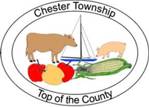|
When most of us think
of a blacksmith, we picture a burley man sweating over a forge and pounding a horseshoe using a hammer and anvil. Although many blacksmiths did make horseshoes and shoe horses, this is really the work of a farrier.
“A blacksmith
is an artisan specializing in the hand-wrought manufacture of metal objects, such as wrought iron gates, grills, railings,
light fixtures, furniture, sculpture, weapons, decorative and religious items, cooking utensils and tools.”*
The records indicate
that three villages in Chester Township had blacksmith
shops: Conklin, Lisbon, and Six Corners.
More is known about the blacksmith shops in Conklin. J. B. Wicks published
an ad for his blacksmith shop in the December 12, 1911edition of the Conklin Enterprise
newspaper. Both William Bromer and J. B. Wicks are listed as blacksmiths in the
1918 Farm
Journal Illustrated Directory of Ottawa
County, Michigan - Business Directory.

In the July 31, 1931
edition of the Coopersville Observer, an article on the history of Conklin states,
“Two blacksmith
shops are located in Conklin and the work of the residents of village and surrounding territory are ably cared for by Henry
Wiltenberg and Frank Lacey. There is a fascination centering in the blacksmith shop of any village that never entirely leaves
a person. Poem and prose have been written in days gone by, the inspiration for which was received from watching the work
of the village smithy.
The passing of
the "horse age" is deplored by Mr. Lacey, whose preference for the branch of work including their shoeing is very strong.
He mentions that many times in the old days he with the help of another blacksmith had been kept busy from four a. m. until
ten p. m.”
*Wikipedia, the free encyclopedia, http://en.wikipedia.org/wiki/Blacksmith
|

